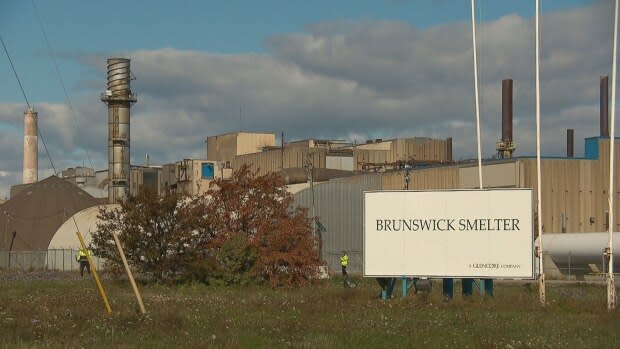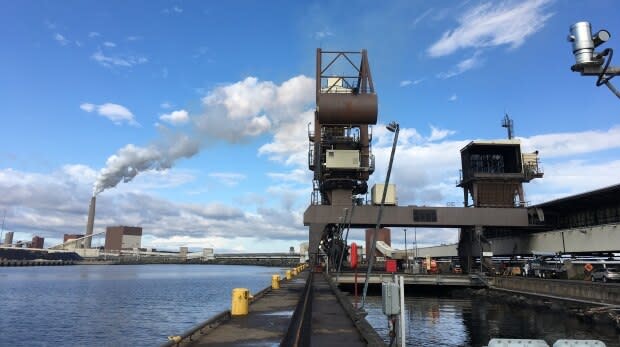Urgent need for committee to help 420 Brunswick Smelter employees losing jobs in closure
Bathurst Mayor Paolo Fongemie is calling on the provincial government to immediately establish a labour force adjustment committee for the 420 Brunswick Smelter employees who will soon be out of work.
The smelter's parent company Glencore Canada Corp. announced Wednesday it plans to permanently close the 53-year-old plant in Belledune by Christmas.
Fongemie also wants the province to develop an economic strategy for northern New Brunswick.
It used to be a "strong industrial region," but with the impending smelter closure, the government is now one of its biggest employers through hospitals, Service Canada and the community college, he said.
The smelter marks the third major plant closure in the Chaleur region in the past 15 years, resulting in a total loss of roughly 2,000 well-paying trades jobs.
"We were able to manage to overcome the first two," said Fongemie, referring to the Bathurst mill shutdown in 2005 and the Brunswick Mine being shuttered in 2013.
"We will overcome this one also because that's who we are the northern part of the province. You know, we just pull up our sleeves and we work hard together and resiliency is part of [our] DNA, but it's still frustrating."
In announcing the closure, Glencore officials said the Brunswick Smelter hasn't been profitable for three years, losing an average of $30 million per year. The decision to close is unrelated to the six-month contract dispute with its unionized employees, who represent more than half of its workforce, officials said.
Premier Blaine Higgs held an emergency meeting with Glencore officials Wednesday night, but Post-secondary Education, Training and Labour Minister Trevor Holder said it was clear the company is leaving.
"There is no way to change their mind," he told Information Morning Fredericton on Thursday.
The company has said it will offer some employees work at other facilities in other provinces or other countries.
The United Steelworkers union has said it hopes many of the employees will qualify for early retirement and severance packages.

Fongemie contends there's an urgent need for the government to put in place a committee "where both the employer and the union sit down with some key partners of the region" to "take care" of the smelter employees.
Those with formal certification may be able to find work elsewhere, but those without might not be as lucky, he said.
Some of them probably got their start as a labourer and have never written a resumé or gone through an interview process, said Fongemie.
"So for them that committee will be important to help them get new training, help them to prepare [for] job searching."
Such a committee was struck when the mine closed and worked well, said Fongemie.
'Collateral damage'
But it's not just the 420 smelter employees and their families who will be affected by the closure, he said. There will be widespread "collateral damage" in the village of about 1,400.
Many contractors and truck drivers rely on the plant for business and the Trevali mine sells its ore to Glencore for the smelter.
Other area businesses benefit from the spin-off effect of having so many well-paying jobs in the region, said Fongemie.

The Port of Belledune was built for the smelter in 1968, noted president and CEO Denis Caron. He said he's "overwhelmed" by news of the impending closure.
He had been "hopeful" the smelter would keep producing, given Glencore's recent investments in the plant. The company spent about $20 million on the first phase of an estimated $64 million acid plant upgrade. The rest of the project was cancelled in August amid the labour dispute.
"I thought perhaps that there could be maybe a temporary closure but we certainly weren't expecting this," said Caron.
$1M loss for port
The smelter, one of the port's three tenants, accounts for about $1 million of its revenue, he said.
Still, the port is "in a solid position," said Caron. It has been diversifying its product mix for the past few years to ensure it's not dependent on any particular client and has seen "great growth."
The smelter represents only about 10 per cent of its business. About 24 different bulk products from around the world were shipped through the port last year, totalling about three million tonnes.
Last month, the province announced a $7-million expansion at the port to increase capacity. It's part of a $21-million project to fill in the water gap between terminals 3 and 4 to enlarge the berth by 15,000 square metres and improve the ability to move cargo between terminals as well as to and from ships.

The port has plans to attract more volume and more product, said Caron.
"So we'll just have to put our shoulder to the wheel and work with the province and the federal government to see if we can't make these things happen."
Belledune Mayor Joe Noel said he wants to see if any of the buildings on the smelter site can be used to help attract another business, rather than just being bulldozed.
"I mean, it is very close to the port. And you know I think there's going to be some opportunities … I think that that has to be explored, definitely."
Federal agency relocation proposed
New Brunswick Liberal Leader Kevin Vickers thinks the federal government should look at relocating one of the "huge agencies" in Ottawa to northern New Brunswick. The translation bureau, for example, employs roughly 2,000 people.
"Surely to goodness we could be better served in Confederation as a province [if] we get our fair share and what the north needs is an anchor" employer, said Vickers.
Oromocto has the 5th Canadian Division Support Base Gagetown, while Miramichi has the Public Service Pay Centre pay centre, but the north "has nothing.
"I think it's time for the federal government to consider finding an anchor for that corner of our province."
Up to 10 smelter employees are expected to be kept on to decommission the plant over the next few years, officials said.
About 281 unionized workers have been off the job since April 24, after they gave 72-hour strike notice. The union has called the work disruption a lockout, but the company said that because employees were paid until the strike deadline, it was a strike.
The last contract expired in February 2019.


